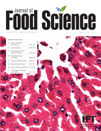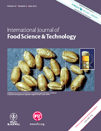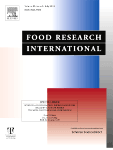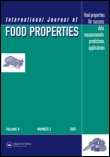
FOOD HYDROCOLLOIDS
Scope & Guideline
Pioneering Research at the Intersection of Food Science and Hydrocolloids
Introduction
Aims and Scopes
- Functional Properties of Hydrocolloids:
Research on the functional characteristics of various hydrocolloids, including their thickening, gelling, emulsifying, and stabilizing properties in food systems. - Food Texture and Structure:
Studies that investigate how hydrocolloids influence the texture and microstructure of food products, impacting sensory attributes and consumer acceptance. - Interactions and Complexes:
Exploration of the interactions between hydrocolloids and other food components (proteins, lipids, polysaccharides) and the formation of complexes that alter food properties. - Innovative Applications:
Development of novel food products and formulations utilizing hydrocolloids for improved health benefits, including functional foods and dietary supplements. - Sustainability and Food Preservation:
Research aimed at using hydrocolloids in sustainable food packaging and preservation techniques to extend shelf life and reduce food waste. - Processing Techniques:
Studies on the effects of various processing methods (e.g., extrusion, high-pressure processing) on the properties and functionalities of hydrocolloids. - Gastrointestinal Behavior:
Investigations into how different hydrocolloids affect the digestion and bioavailability of nutrients, with implications for gut health.
Trending and Emerging
- Plant-Based Ingredients:
Growing interest in utilizing plant-derived hydrocolloids and proteins, reflecting the trend towards plant-based diets and alternatives in food products. - 3D Food Printing:
Increased focus on the application of hydrocolloids in 3D food printing technologies, exploring how they can be used to create intricate food structures and textures. - Functional Foods and Nutraceuticals:
Rising research on the use of hydrocolloids to enhance the health benefits of foods, including their role in delivering bioactive compounds and improving gut health. - Nano- and Micro-Encapsulation:
Emerging studies on encapsulation techniques utilizing hydrocolloids for controlled release of flavors, nutrients, and bioactive compounds in food products. - Smart Packaging Solutions:
Innovative applications of hydrocolloids in developing smart and active packaging materials that can respond to environmental changes and enhance food preservation. - Sustainable Practices:
An increase in research on the sustainable sourcing and application of hydrocolloids, focusing on reducing food waste and promoting eco-friendly packaging solutions. - Gastrointestinal Modeling:
Growing emphasis on studies that model the gastrointestinal behavior of hydrocolloids, providing insights into their effects on digestion and nutrient absorption.
Declining or Waning
- Traditional Hydrocolloid Applications:
Research focused on conventional uses of hydrocolloids, such as thickening and gelling in standard recipes, appears to be decreasing as the field shifts towards more innovative applications. - Basic Rheological Studies:
Papers solely dedicated to fundamental rheological properties without specific food applications are becoming less common, possibly due to a shift towards applied research. - Single Hydrocolloid Studies:
There is a noticeable reduction in studies focusing on individual hydrocolloids in isolation, as research trends move towards understanding complex interactions among multiple ingredients. - Static Properties of Hydrocolloids:
Research emphasizing static properties of hydrocolloids without considering dynamic behavior or processing conditions is declining, reflecting a trend towards more comprehensive studies.
Similar Journals

FOOD TECHNOLOGY AND BIOTECHNOLOGY
Transforming Ideas into Impactful Food InnovationsFOOD TECHNOLOGY AND BIOTECHNOLOGY is a distinguished peer-reviewed journal published by the Faculty of Food Technology and Biotechnology, University of Zagreb, Croatia. Since its inception in 1993, this Open Access journal has become a crucial platform for disseminating innovative research in the fields of food science, biotechnology, and chemical engineering. With a commendable impact factor and consistent Q2 and Q3 rankings across multiple categories—including Biotechnology, Food Science, and Industrial Engineering—this journal not only fosters academic discussions but also addresses real-world challenges in food production, safety, and sustainability. As it converges its thematic scope from 1996 to 2024, FOOD TECHNOLOGY AND BIOTECHNOLOGY remains committed to advancing knowledge through high-quality research and interdisciplinary collaboration, making it an essential resource for researchers, professionals, and students seeking to stay at the forefront of food innovation and biotechnology.

JOURNAL OF FOOD SCIENCE
Transforming Discoveries into Practical SolutionsJOURNAL OF FOOD SCIENCE, published by Wiley, is a premier journal dedicated to advancing the field of food science, bridging the gap between fundamental research and practical application. With an impressive impact factor reflecting its authoritative status, the journal is ranked in the Q1 quartile for Food Science in 2023 and boasts a Scopus ranking of #71 out of 389, placing it in the 81st percentile within Agricultural and Biological Sciences. First launched in 1936, the journal continues to serve as an essential platform for researchers, professionals, and students to disseminate innovative studies and reviews that address critical issues in food quality, safety, and technology. While not currently offering open access, its rigorous peer-review process ensures the dissemination of high-quality and impactful research. Researchers engaged in the vital disciplines of food science will find this journal indispensable for keeping abreast of cutting-edge developments in the field.

International Food Research Journal
Cultivating Knowledge for a Sustainable Food FutureThe International Food Research Journal, published by UNIV PUTRA MALAYSIA PRESS, serves as a pivotal platform for disseminating innovative research within the field of food science. With an ISSN of 1985-4668 and an E-ISSN of 2231-7546, the journal has successfully established its presence since its inception in 2007, converging its findings through 2024. This esteemed journal holds a Q3 ranking in Food Science, illustrating its valuable contributions to the field as demonstrated by its Scopus rank of 276 out of 389, placing it in the 29th percentile among its peers in Agricultural and Biological Sciences. Although it operates under a traditional publishing model, its academic integrity and focus on high-quality research ensure that it remains a vital resource for researchers, professionals, and students eager to explore advances in food technology, nutrition, and safety. By encouraging interdisciplinary collaboration and critical dialogue, the International Food Research Journal plays an essential role in shaping the future of food science research.

Food Chemistry-X
Pioneering Research for a Healthier Tomorrow.Food Chemistry-X is a premier open-access journal published by Elsevier, dedicated to advancing the field of food chemistry through high-quality research and comprehensive reviews. With its ISSN of 2590-1575, the journal has gained significant attention since adopting an open-access model in 2019, allowing wide dissemination of knowledge and innovations in food science. Based in the United Kingdom, it holds prestigious Q1 rankings in both Analytical Chemistry and Food Science categories as of 2023, positioning itself as a leading platform for researchers worldwide. The journal's focus spans extensive topics within food chemistry, including food safety, nutritional analysis, and the chemical properties of food, offering insights that are crucial for addressing contemporary challenges in food production and consumption. With a Scopus rank placing it in the 65th percentile among the top journals in Food Science and the 58th percentile in Analytical Chemistry, Food Chemistry-X is an essential resource for academics, professionals, and students seeking to stay at the forefront of research and innovation in this vibrant field.

INTERNATIONAL JOURNAL OF FOOD SCIENCE AND TECHNOLOGY
Leading the Way in Food Science and TechnologyINTERNATIONAL JOURNAL OF FOOD SCIENCE AND TECHNOLOGY, published by WILEY, serves as a premier platform for the dissemination of cutting-edge research in the field of food science and technology. With an ISSN of 0950-5423 and E-ISSN 1365-2621, this journal has been committed to publishing high-quality research since 1966 and is set to continue its impactful contributions through 2024. Recognized for its excellence, it holds a Q1 ranking in Food Science and a Q2 ranking in Industrial and Manufacturing Engineering as of 2023. The journal ranks #95/384 in Industrial and Manufacturing Engineering and #100/389 in Food Science on Scopus, placing it within the top quartiles of these fields. Although it does not currently offer Open Access, researchers and professionals benefit from access to a wealth of knowledge that advances understanding in both applied and theoretical aspects of food science. This journal is indispensable for anyone in the academic and professional domains who seeks to stay abreast of innovations and trends shaping the food industry.

Acta Scientiarum Polonorum-Technologia Alimentaria
Exploring the Future of Food TechnologyActa Scientiarum Polonorum-Technologia Alimentaria, published by Poznan University of Life Sciences, is a revered journal in the field of food science, showcasing cutting-edge research and innovations in food technology. Established as a leading platform within its domain, this journal is indexed under Scopus and ranks in the 2023 Q3 quartile for Food Science, demonstrating its commitment to high-quality scholarship. With an ISSN of 1644-0730 and E-ISSN 1898-9594, it serves as a critical resource for researchers, professionals, and students seeking to stay at the forefront of advancements in food safety, quality control, and sustainable practices. The journal has also been recognized for its contributions to the agricultural and biological sciences, positioning itself at rank #205 out of 389 in this competitive field. While currently not offering open access, the journal's valuable insights and findings, especially as it publishes through 2024, play a crucial role in advancing knowledge and fostering collaboration among experts in the food science sector.

FOOD RESEARCH INTERNATIONAL
Transforming Research into Food SolutionsFOOD RESEARCH INTERNATIONAL is a premier academic journal published by ELSEVIER, specializing in the field of Food Science. With an impressive impact factor and ranked Q1 in the 2023 category quartiles, it stands at the forefront of research, positioned 17th out of 389 in the Scopus ranking for Agricultural and Biological Sciences, attaining a commendable 95th percentile. The journal publishes high-quality, peer-reviewed articles that cover a broad spectrum of topics, including food safety, quality control, nutrition, and biotechnology, making it an invaluable resource for academics, industry professionals, and students alike. As FOOD RESEARCH INTERNATIONAL seeks to enhance understanding and advance technologies related to food, it encourages innovative perspectives and interdisciplinary research. The journal, active from 1992 and continuing through 2024, is an essential platform for disseminating vital findings and fostering collaboration within the global food science community.

CZECH JOURNAL OF FOOD SCIENCES
Pioneering Research for a Sustainable Food FutureCzech Journal of Food Sciences is a premier publication in the field of food science, disseminating vital research since its inception in 1999 and transitioning to Open Access in 2007. Published by the Czech Academy Agricultural Sciences, this journal facilitates the exchange of knowledge among researchers, professionals, and students dedicated to advancing the understanding of food systems, safety, and technology. With an ISSN of 1212-1800 and an E-ISSN of 1805-9317, it holds a respectable position with a Q3 ranking in the Food Science category for 2023, illustrating its commitment to high-quality research despite its Scopus rank of 209 out of 389, situated in the 46th percentile. Located in the heart of the Czech Republic, at TESNOV 17, PRAGUE 117 05, this journal serves as an essential resource for those involved in agricultural and biological sciences, paving the way for innovative discoveries and applications in food science.

INTERNATIONAL JOURNAL OF FOOD PROPERTIES
Connecting researchers to the future of food science.INTERNATIONAL JOURNAL OF FOOD PROPERTIES, published by TAYLOR & FRANCIS INC, is a leading platform for disseminating high-quality research in the field of food science. With an ISSN of 1094-2912 and E-ISSN of 1532-2386, this journal has been committed to open access since 2018, ensuring that groundbreaking studies are readily available to global audiences. The journal has steadily gained recognition for its contribution to the discipline, achieving a Q2 ranking in Food Science and placing in the 68th percentile among its peers according to Scopus metrics. Covering a wide array of topics related to the properties and applications of food, it serves as a valuable resource for researchers, professionals, and students alike. With coverage extending from 1998 to 2024, the journal continually seeks to advance knowledge and foster innovation within the food science community, making it a pivotal publication for anyone serious about this vital field.

Food Hydrocolloids for Health
Unlocking the Potential of Hydrocolloids for WellnessFood Hydrocolloids for Health, published by ELSEVIER, stands at the forefront of research in the fields of food science, gastroenterology, nutrition, and pharmaceutical science. With an ISSN of 2667-0259 and an impressive positioning in the academic community, the journal is ranked Q1 in Food Science and Pharmaceutical Science, alongside Q2 rankings in Gastroenterology and Nutrition and Dietetics as of 2023. This journal serves as a critical platform for disseminating innovative findings related to the health benefits of food hydrocolloids, emphasizing their applications and efficacy in nutrition and medicine. Researchers, professionals, and students can access cutting-edge studies that promote the understanding of health outcomes derived from hydrocolloid-based foods. The journal’s international outreach from the Netherlands facilitates a diverse array of contributions, making it essential for those engaged in advancing knowledge within these dynamic disciplines.